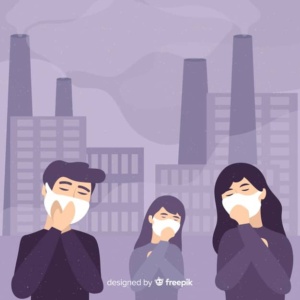Air Pollution: We can’t breathe
By Ore Taiwo Makinde.
The distress call, “I can’t breathe” became a popular chant for freedom against the unprecedented oppression, unparalleled racism and unnecessary deaths depicted in the killing of George Floyd and several African Americans. It is certainly heart-wrenching to watch the life of a fellow-human being snuffed out in broad daylight by those responsible for upholding law of the land. Whatever happened to the police motto, ”To serve and protect”? Air pollution sets us up for this same effect unawares.
Many of us face everyday situations in which we feel choked. It could be from someone breathing down your neck at work or from unwanted wafts of fumes assailing your senses. Or have you ever woken up suddenly at night trying to catch your breath following a nightmare or panic attack? This feeling of not being able to breath is also likely to resonate with some individuals who developed the COVID-19 illness.

Driving through tight rows of traffic, there is almost always a bit of congestion. In an experience that I had, I wound down my window, wondering why we seemed stuck. Cars inched forward very slowly only for me to feel a cloud of dust and smoke enter my eyes and nose as a truck on the other side of the carriageway raced by. Have you ever been in the same rut?
We can’t breathe easy but sometimes we don’t even know it. How is this possible? Bringing it home; many of us have heard stories about loved ones dying in their sleep due to the inadvertent inhalation of deadly fumes from their generating sets at night. The fumes responsible for this may not have a recognisable smell or odour.
There was a situation report from the World Health Organisation (WHO) in May 2018 showing that 9 out 10 people are exposed to air pollutants, with estimates that seven million people globally die from the effects of air pollution.
What are non-communicable diseases? Air pollution has also been discovered to be a leading cause of deaths from non-communicable diseases (NCDs). NCDs are non-infectious diseases, hence they cannot be contracted from another person like the deadly coronavirus. They include hypertension, heart disease, diabetes, asthma, chronic obstructive lung diseases, lung cancer, and respiratory infections such as pneumonia. WHO has referred to air pollution as an invisible killer that preys upon the young and the old due to the tiny, fine invisible particles that the pollutants are composed of.
Important statistics. Here are some mind-boggling facts from the WHO. Air pollution contributes to the following global statistics:
24% of all stroke deaths are traceable to air pollutants.
25% of all deaths from heart disease are attributed to air pollution.
43% of deaths from lung diseases including lung cancer are linked to air pollution.
So where do these air pollutants come from? They come from emissions in the outdoor air resulting from fuel combustion in vehicles, generating sets, industrial houses, cement factories, oil refineries, dust-storms and bush-fires. Pollutants also come from household air impregnated with fumes from cooking with firewood and other fossil fuels. The major culprit among these particles are hydrocarbons which settle like black soot in our respiratory and cardiovascular passages, building up over time and causing obstruction and many times, irreversible damage. Other dangerous pollutants include noxious gases such as carbon monoxide which leads to acute fatality.
Preventive measures. With the recognition of the deadly effect of these pollutants, can we improve our air quality to ensure that the air we breathe in is safe? Or has it come to a time that our face masks will serve not only as protection from the coronavirus but also against dangerous air particles? Here are a few preventive lifestyle tips that should be taken into consideration:
- Clean cooking stoves regularly, particularly the ones that use wicks and avoid the use of firewood.
- Buy fuel from reliable sources to avoid purchasing fuels that are incompletely combustible.
- Engines should be maintained and serviced regularly.
- Turn off generating sets at night. Note that even when you direct the pipe from which fumes emanate away from your window, it goes in the direction of another person’s.
- Invest in solar energy and energy inverter systems in order to eliminate the use of generating sets.
- Cement factories, oil refineries, etc should be situated far away from human habitation and vice-versa.
- Factory workers should wear personal protective equipment daily at work especially face masks.
- Industrial workers who are at risk of exposure to dangerous fumes and chemicals should undergo an annual medical examination. should be let off work for a while if their risk is very high.
- Avoid bush-burning and open incineration of wastes.
- Wind up your windows or wear a face-mask once you encounter a high level of pollutants as seen in traffic or areas where you have no control over the pollution.
- Last but not least, advocacy for public health policies to eliminate sources of air pollution should be embraced.
Until we are free of human-made pollutants, we truly cannot say that we can breathe.
Dr Ore Taiwo Makinde is a Consultant Family Physician and certified Lifestyle Medicine Physician.
